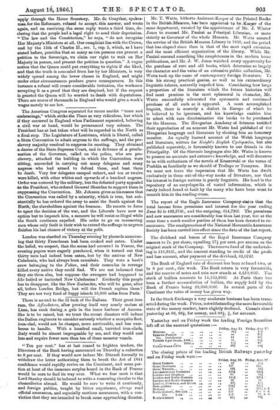Mr. T. Watts, hitherto Assistant-Keeper of the Printed Books in
the British/Mt...scum, his been appointed, to be .Keeper of the same department, vacated by the appointment of Mr. J. Winter Jones to succeed Mr, Panizzi as Prineipel, Librarian, or more strictly as Governor of the whole Museum. Mr. Watts entered the serviee of the British Museum Library in 1838, and. the period that, has elapsed since then is that of the most rapid extension and the most efficient organization of the library. While Mr. Panizzi ensured something like completeness in the modern home publications, and Mr. J. W. Jones watched every opportunity for the purchase of rare and old books, which determine so largely- the character and the value of an extensive publio collection, Mr. Watts took up the cause of contemporary foreign, literature. To this his strong practical genius, ,as -well as his extraordinary linguistic talents, naturally impelled him. Considering how large a proportion of the literature which the future historian will find most precious is the most ephemeral in, character, Mr. Watts successfully advocated the systematic and continued purchase of all such as it appeared. A most accomplished linguist, there is scarcely a dialect in Europe of which he is believed to be ignorant, and his knowledge enables him to select with rare discrimination the books to be purchased for the Museum. The Hungarian. Academy of Sciences testified their approbation of an account Mr. Watts had published of the Hungarian language and literature by electing him an honorary member. An equally learned account of the Welsh language and literature, written for Knight's Englfsh Cyclopaxlia, but also published separately, is favourably known to our friends in the Principality. Of the Slavonic languages also Mr. Watts is known to possess an accurate and extensive knowledge, and will discourse to us with enthusiasm of the novels of Kraszewski or the verses of Pushkin 9,S familiarly as we should of Trollope or Tennyson. But we must not leave the impression that Mr. Watts has dwelt exclusively in these out-of-the-way nooks of literature, nor that his interest in foreign nations, is purely linguistic. His head is the repository of an encyclopaedia of varied information, which is rarely indeed found at fault by the many. who have been vront to consult him in the reading-room.






























 Previous page
Previous page